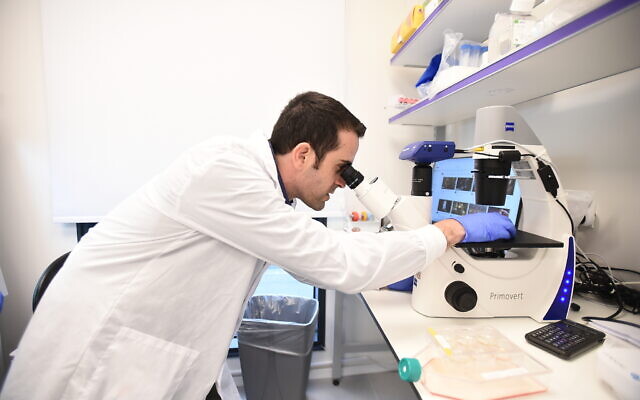Israeli cultured milk company Wilk (formerly Biomilk) recently nabbed a US patent for its proprietary methods and technologies to produce animal-free cultured milk and cell-based human milk, placing the company firmly on track to scale its development and enter a dairy market that was valued at over $800 billion in 2020, and an infant formula industry that is expected to reach over $100 billion by 2026.
The exclusive patent, awarded in February by the US Patent and Trademark Office, protects the company’s intellectual property and covers the methods and systems Wilk developed for the cultivation and separation of milk components from cultured cells, as the company now turns its focus on processes that increase production volume, said Wilk CEO Tomer Aizen.
For the animal-derived cultured milk, Wilk uses mammal cells “that are then grown and cultivated” in bioreactors, combined with a “secret sauce,” Aizen told The Times of Israel in a videoconference interview in February, referring to processes based on a decade of proprietary research by Dr. Nurit Argov-Argaman and Maggie Levy of the Hebrew University of Jerusalem.
Argov-Argaman and Levy co-founded Wilk (as Biomilk) in 2018 and went public on the Tel Aviv Stock Exchange last year in a SPAC (special-purpose acquisition company) merger deal.
Wilk’s processes are also applied to the lab production of human breast milk — complete with the fats and proteins that make up important parts of the nutritional value — using cells from breast reduction surgeries, Aizen explained.
Included in the patent was the secretion process Wilk developed so that the cells behave “like in mammals,” he said, adding that the company was “now focusing on a system that creates volume.”

Wilk’s vision is to “deliver unique components to industries that need these ingredients so that they can integrate them into their own products,” Aizen said.
Last year, Wilk signed a strategic agreement with the Central Bottling Company, also known as Coca-Cola Israel, to develop products based on its cultured milk technology. Coca-Cola Israel owns the Tara dairy cooperative, Israel’s second-largest milk processing company with about 12 percent of the market share.
As part of the agreement, Coca-Cola Israel agreed to invest a total of $2 million in Wilk, as it set milestones for production.
Aizen said that Wilk will soon move from the research and development stage to a pilot stage, and hopes to reach the market with a “cheese or yogurt that will contain our cultured milk components” by 2024.
The company’s cultured human milk operations will likely take longer, Aizen estimated, as there is significant regulatory legwork, “and many more stages to get through.”

Wilk is one of several Israeli food tech companies developing cultured, animal-free milk, each at a different development stage. Rehovot-based Remilk, for example, recently raised $120 million for cow-free milk, cheese, and yogurt, and with production capabilities already off the ground.
However, Wilk is one of very few companies on the world stage in the cultured breast milk sector.
An American company, Biomilq, declared last year that it was the “world’s first” to create cell-cultured human milk from mammary cells outside of the human body. The North Carolina-based firm, founded in 2019, takes cells from mammary glands, feeds them nutrients so they can proliferate, and then transfers them to a bioreactor where they continue to multiply to create a milk-making process. But Biomilq’s product is not bio-identical to breastmilk, the company says.
Biomilq raised $21 million in Series A funding with Bill Gates’ investment firm, Breakthrough Energy Ventures, and other backers, as it looks to present an alternative to soy- or cow-based infant formula and reach commercialization by 2025.
In Singapore, TurtleTree developed a key milk ingredient, lactoferrin, used in infant formula to regulate the body’s absorption of iron and which has so far been derived from cows. TurtleTree says it has successfully produced human-derived lactoferrin and is moving into the commercial stage to make formula nutritionally closer to human milk.
[huge_it_slider id=”15″]Aizen said that while “nothing can replace breastfeeding” for its significant benefits and complex nutritional value, including key antibodies passed on to babies, Wilk is the “first company that can get as close, because we work [solely] with human milk,” with no added nutrients or components.

Wilk’s offering could be a welcome alternative for those who prefer to give human milk, but face difficulties breastfeeding, for babies born prematurely, and for those who cannot consume commercial infant formula.
But Wilk is not necessarily looking to replace infant formula, and Aizen suggests formula companies may be allies.
“It is a win-win situation for everyone. We want to work together with the industry and we are looking for partners who can get us there. The opportunities are endless,” he said, adding that the aim is to have a product that is better nutritionally and with a cost comparable to formula.
Wilk is based in Rehovot and employs about 20 people in both its cultured animal milk and human milk divisions. Aizen said the teams share knowledge and collaborate on research and the systems are similar.


